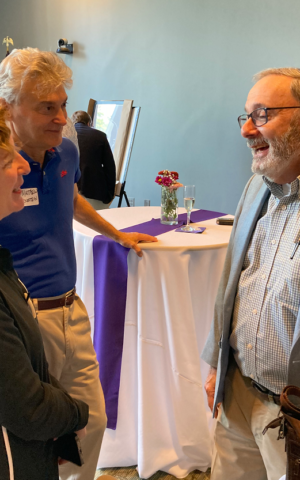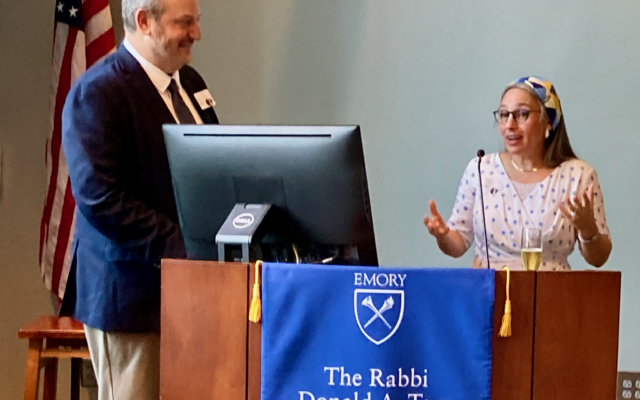Emory’s Tam Institute Welcomes a New Leader
Yiddish studies scholar Miriam Udel takes over from Eric Goldstein.
Dr. Miriam Udel, an associate professor of Yiddish language, literature and culture at Emory University, has been formally installed as director of the Tam Institute for Jewish Studies at Emory University. She succeeds Dr. Eric Goldstein, who, for the last decade, guided what has become the largest Jewish studies program in the south.
At a reception for both Goldstein and Udel that was held Sept. 16 on the Emory campus, Udel praised her predecessor’s leadership in expanding the program, particularly over the last five years. During that time, four new faculty members were and the Institute’s administration has been reorganized around a new professional staff and a new executive director.
This year Jewish studies students will, for the first time, be offered an opportunity to study abroad in Poland. Udel praised Goldstein for his exceptional administrative skill at a difficult time in higher education.
“Not only does he understand how to get things accomplished,” she said “but he also operates from a keen sense of how the most prosaic administrative details relate to the big human picture. His careful stewardship really brought us through a fiscally lean time during which the impact of this institute nevertheless grew rather than shrinking.”

Goldstein, who is currently on a yearlong academic sabbatical, has built a program with a faculty of 17 scholars from six departments in the College of Arts and Sciences, plus a representative from the Emory University School of Law and from Emory’s Candler School of Theology; another 15 Emory professors offer occasional courses. Goldstein pointed out that such a program is, by design, “looking outward” from a variety of points of view.
“We never want Jewish studies to be sequestered,” he said, “as a field so separate that it doesn’t meaningfully engage with all of the different disciplines and fields that surround us. The Tam Institute is crafted in a very particular way to meet that goal. We had the opportunity over the years to be a department. And time and time again, our faculty chose not to be a department, but to be an interdisciplinary institute, because this way each of us can be in our departments engaging with colleagues in different fields, but also have the chance to come together across disciplines to discuss issues of mutual concern.”
Under Goldstein’s leadership, the institute continued the yearly Tenenbaum Family Lecture Series each spring that is open to the Atlanta community. For the lecture’s 25th anniversary in March, the institute brought Dr. Have Tirosh-Samuelson, an expert on Jewish environmental ethics at Arizona State University.
In early November, the Tam Institute’s fall lecture series will feature Dr. George Sanchez, professor of American Studies at the University of Southern California. He will speak on the historical relationship between the Jewish and Mexican American communities in East Los Angeles. The series is named in honor of The Temple’s Rabbi Jacob Rothschild, who was a leader on social issues in the American Jewish community. He died in 1973.
The growth of the Jewish Studies program at Emory is due, in part, to the substantial support it receives by the university’s leadership. For administrators like Dr. Greg McGonigle, dean of religious spiritual life at Emory, the Tam Institute offers a model of some of the best the school has to offer.
“Having the largest Jewish studies department in the southern United States here at Emory is just such an amazing treasure,” he commented, “and I think the Tam Institute brings a really thoughtful investigative approach to understanding the Jewish tradition, understanding issues of antisemitism and understanding connections with other cultures and religions. And I think other departments, other areas of the university really look to the Tam Institute as a model for not only the curricular engagement, but also the community engagement as well.
Looking to the future, Udel says she’s working on a proposal that takes advantage of what the institute has learned during almost three years of living with the COVID pandemic. With additional funding, look for the use of more teaching technology, she said, in coming years.
“We are in the planning stages of a new initiative designed to harness the skills in virtual living and thinking that the pandemic forced us to learn. We want to put those skills in service of a vibrant scholarly exchange we are creating. So, if you know of any restless philanthropists, please send them my way.”
In 2001, the program got a big boost when it received a $5 million dollar challenge grant given by Arthur Blank, one of the founders of Home Depot. Another $5 million was raised for the initial endowment. The Institute is named after Blank’s longtime friend and spiritual mentor, Rabbi Donald A. Tam of Temple Beth Tikvah, in Roswell. He was an honored guest at the reception in mid-September.
- News
- Local
- Bob Bahr
- Emory University
- Tam Institute for Jewish Studies
- Rabbi Donald Tam
- Eric Goldstein
- Miriam Udel
- Arthur Blank
- Tim Holbrook
- George Sanchez
- Hava Tirosh-Samuelson
- Emory’s Candler School of Theology
- Tenenbaum Family Lecture Series
- The Temple
- Rabbi Jacob Rothschild
- Dr. Greg McGonigle
- Home Depot
- Rabbi Donald A. Tam
- temple beth tikvah




comments